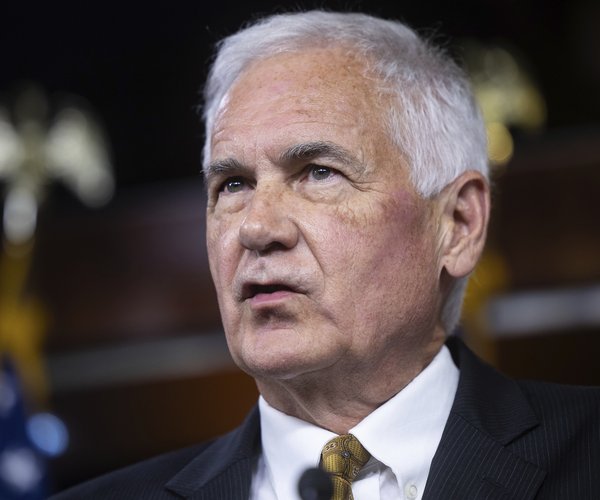Although Turlock City Council member Steven Nascimento had good intentions when introducing a new city ordinance that would put limits on campaign finances, not everyone at Tuesday’s Council meeting was supportive of the proposed changes.
The ordinance, which ended up being postponed by the Council due to public opposition, would have ensured that Turlock City Council members could not vote for or make any political decision that would directly benefit a major campaign contributor.
“All that this ordinance would require is that if a major campaign contributor made a $2,000 or more contribution to a council member, then that council member must recuse him or herself from decisions relating to the direct benefit of that donor," said Nascimento. "As it stands right now, a council member could receive campaign contribution, and then a week later, turn around and vote in favor of that contributor, which I think to the public would seem deplorable.”
Although most of those opposing the ordinance said that while it was well-intentioned, it violates personal freedoms and could result in many unforeseeable consequences.
Others, such as Rich Borba of JKB Energy, asserted that the change in city code would not only give an advantage to incumbents during election season, but also is an attempt to fix a perceived problem rather than actual corruption.
“I think it would be very easy to corrupt this,” said Borba. “It might be well-intentioned, but it creates serious unattended consequences, and will favor incumbents as opposed to newcomers who are trying to run for council.”
Mike Harcksen, president of the Turlock Firefighters Local 2434, echoed Borba’s opinion, saying that the ordinance would favor independently wealthy candidates.
“This would hurt those who cannot afford to finance their own campaign and rely on contributions,” said Harcksen. “The Turlock Firefighters are boldly opposed to this ordinance.”
Continuing to push for the ordinance, Nascimento explained that the changes would not place limits on the amounts a major campaign contributor could give to any candidate, but rather focuses on transparency measures to help garner public trust in their elected officials.
City Attorney Phaedra Norton, who helped Nascimento write the official language for the ordinance over the past two months, explained to the audience and Council that the ordinance would prohibit a council member from using his or her position of power to influence a decision that they have a financial interest in, or that would have a material effect on one of their major campaign contributors.
Should a contributor make a donation of $2,000 or more to a committee that is not controlled by a candidate for the City Council, but to a committee that is in support of a specific candidate, then a portion of the contribution must be deemed to have been made by the contributor directly to the candidate whom the committee expended money towards. The same would also apply for committees that expend money in opposition to a candidate for council, with the portion of the money contributed being deemed in support of all other candidates.
In both instances, the deemed portion of the major contribution would be determined by the following mathematical equation: The amount expended by the committee in support of the candidate would be divided by the total expenditures of that committee. The resulting amount would then be multiplied by the contribution amount to the committee, resulting in the portion deemed to have been made by the contributor directly.
For example, if Committee A spent $8,000 in support of a candidate, and has a total expenditure amount of $16,000, then a major contributor’s donation of $2,400 to that committee would be multiplied by 0.5, resulting in $1,200. Although the $2,400 contribution was made to Committee A, which is not controlled by the candidate, $1,200 of it would be considered a contribution from that person or entity to the candidate directly.
Since a portion of the contribution would then be considered a direct contribution to a candidate, that candidate, if elected, would then be prohibited from making or influencing decisions that would directly benefit the contributor, as the council member would be deemed as having a financial interest.
Taking issue with the proposed equation, Borba asserted that it would not be fair to divide the amount expended in support of the candidate by that of the committee’s total expenditures.
“A lot of times, a committee might have raised money for future elections, so the amount of their total expenditures might not be a proportional limit,” said Borba. “These groups or people give money to a certain council member because they’re supportive of them for specific reasons. What happens if in the future, when the council is considering an item that is related to one of those reasons, then that council member can’t vote on it. When we gave them a contribution, it’s because of where they stood on an issue with hopes that they would be able to help it, and now they may not be able to. This ordinance is inadvertently suppressing free speech.”
Councilwoman Amy Bublak, who says she only learned what the ordinance fully entailed a week ago, agreed with many of the individuals speaking against the ordinance, saying that more time was needed to review the language and what the outcomes might be.
“I don’t begrudge you for bringing this forward,” said Bublak to Nascimento, “but we just have to give the public more time…due to having so many stakeholders wanting more time, and even myself for my own understanding…If morals and ethics are in question, then don’t rush it. There are things we have to look at, so I suggest we slow down, and have more dialogue about it…November is the election, so we have plenty of time.”
Although reluctant to fall into a “stall tactic” – a political maneuver where members of the public continue to delay an item with hopes to see it fall apart – Nascimento agreed to give the item time for review while working alongside Bublak and the city attorney in a subcommittee. Together, the three are expected to discuss the concerns surrounding the proposed ordinance, while giving more time for additional input from stakeholders.
In a 3-2 vote, with Nascimento and Councilmember Forrest White in opposition, the Council opted to place a continuance on the ordinance, while agreeing to make a final decision no later than two meetings from now.
At the next Council meeting on Feb. 25, Bublak and Nascimento are expected to give a report on their meetings with the city attorney reviewing the ordinance, in addition to allowing time for public input.
“I laud you for bringing this forward,” said Mayor John Lazar. “Campaign contributions need to be addressed by the public, and we can see that this is about having a good government and transparency.”





